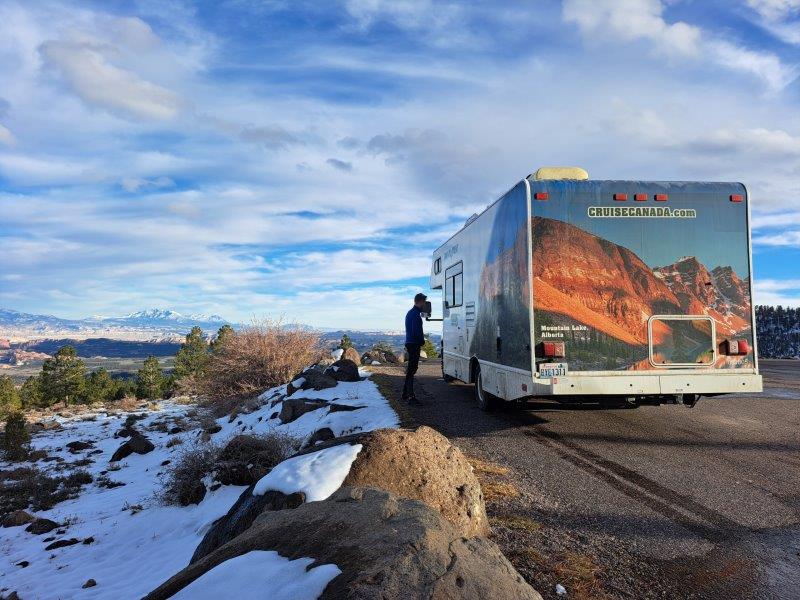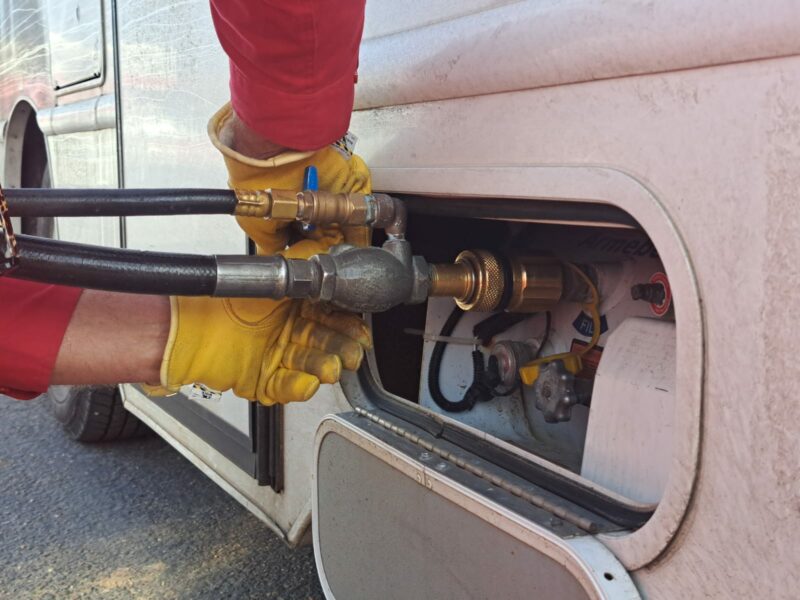We know that hitting the open road in your RV is an amazing experience, and part of that smooth sailing journey is to ensure you get your sanitation and sewage matters resolved smoothly and seamlessly.
Today, we’re diving into a topic that might not be as fun as camper gadgets but is definitely crucial: finding the perfect RV sewer hose for your camper. Though this topic kinda stinks (literally), your RV sewer hose is one of the most important parts of your RV.
With all our travel experience, we’ve learned that having a reliable one makes all the difference when it comes time to dispose of waste both black and grey water. It keeps things clean and hassle-free!
In this guide, we’ll tell you everything you need to know before buying an RV sewer hose for your next road trip.

Understanding RV Sewer Hoses
Your RV sewer hose is what safely and efficiently transports waste away from your RV, helping to maintain a sanitary living environment.
Maintaining a proper sewage system is crucial for hygiene and preventing unpleasant odors in your RV. A good RV sewer hose ensures that waste is disposed of safely and efficiently, preventing leaks and spills that can cause damage to the environment and create health hazards.
Types of RV Sewer Hoses
Not all RV sewer hoses are made the same! Here are all the different types of sewer hoses you may come across on your buying journey.
Standard Sewer Hoses
Standard sewer hoses are common in the RV world, as they offer both simplicity and affordability. These hoses are made from flexible materials like thermal plastic elastomer that can handle regular use, making them a suitable option for occasional campers or those on a tight budget.
Despite their widespread availability, standard sewer hoses might lack some of the advanced features seen in more premium options, and their durability might not match that of heavy-duty hoses. Nonetheless, they provide a straightforward and cost-effective solution for waste disposal.
Heavy-Duty Sewer Hoses
Heavy-duty sewer hoses are crafted with durability and resilience in mind, utilizing thicker and more robust materials like polyolefin to withstand frequent use and harsh conditions.
Ideal for full-time RVers or those who frequently hit the road, these hoses offer superior resistance to punctures, leaks, and UV damage. While they tend to be pricier and bulkier than standard hoses, their long-lasting nature makes them a worthwhile investment for serious adventurers.
Expanding and Collapsible Hoses
Expanding and collapsible sewer hoses stand out for their space-saving design, stretching out during use and neatly folding away for storage. Their flexible nature allows for easy setup and maneuverability, making them a convenient option for RVers with limited storage space.
However, they may not offer the same level of durability as heavy-duty hoses, and ensuring proper drainage can sometimes be a bit more challenging due to their expandable design.
Specialized Sewer Hoses
Specialized sewer hoses cater to unique needs or specific types of RVs, such as hoses with larger diameters for high-capacity waste tanks or hoses designed for use in extreme temperatures.
While these hoses may be harder to find and come with a higher price tag, they offer optimal performance in certain conditions or setups, ensuring that your specific needs are met.
Kit Options
Some manufacturers offer sewer hose kits, providing RVers with a comprehensive package that includes the hose itself along with necessary accessories like fittings, adapters, and storage solutions.
These kits can streamline the waste disposal process, ensuring compatibility between components, and can sometimes offer cost savings compared to purchasing items separately. However, they may come with a higher upfront cost, and you might find that you don’t need every accessory included in the kit.
Key Features to Consider
Materials and Durability
When it comes to choosing an RV sewer hose, the material and durability are critical factors that can make a significant difference in the performance and longevity of the hose.

Generally, a thicker hose tends to be more durable and resistant to punctures and leaks. Look for a hose with a good balance between durability and flexibility for the best results.
Beyond thickness, RV sewer hoses are usually made from various types of plastic or rubber materials, each with its own set of characteristics. Here are the main materials you’ll find in an RV sewer hose:
- Polyolefin: This is a popular choice for sewer hoses due to its durability and flexibility. Polyolefin hoses are resistant to abrasions and cracks, ensuring a longer lifespan even with regular use.
- Vinyl: Vinyl hoses are another common option, offering a good balance between flexibility and durability. They are generally less expensive than polyolefin hoses, making them a great choice for RVers on a budget.
- Rubber: Some high-end sewer hoses are made from rubber, providing excellent durability and resistance to extreme weather conditions. Rubber hoses tend to be more expensive but can offer superior performance and a longer lifespan.
Hose Length
Finding the right length for your hose is important to ensure a hassle-free waste disposal experience. A hose that is too short might not reach the dump station from your RV, causing unnecessary complications.
On the other hand, a hose that is excessively long can be difficult to handle and may pose storage challenges.
Many RV enthusiasts find that a sewer hose measuring around 15 to 20 feet strikes the perfect balance, providing ample reach without becoming unwieldy.
Before making a purchase, assess the typical distance between your RV’s waste outlet and the dump stations at your favorite campsites to determine the ideal length for your needs.
Hose Diameter
The diameter of your sewer hose influences the speed at which waste is expelled.
A wider diameter allows for a quicker waste disposal process, a significant advantage, especially for larger RVs or during extended trips where waste accumulates more substantially. However, they also take up more space due to their larger size.
Standard diameters are usually sufficient for most RVs, but we always recommend considering your specific needs and preferences.
Fittings and Connectors
The fittings and connectors of your sewer hose must be compatible with your RV and the dump station facilities you intend to use. Not all hoses will fit all RV models or dump stations, so verifying compatibility is essential.
You should also ensure that the fittings provide a secure, leak-proof connection, as this is paramount to maintaining hygiene and preventing unpleasant odors.
A sewer hose with fittings that are easy to connect and disconnect can save you a considerable amount of time and effort during the waste disposal process. We recommend looking for hoses that emphasize user-friendly design in their connectors to enhance your overall experience.

Storage and Portability
If storage space is a premium in your RV, a compactly designed sewer hose can be a game changer. Some models are collapsible or feature a slimmer design, making them more convenient to store.
Plus, hoses that come with storage caps help contain mess and odors when the hose is not in use, facilitating cleaner and more pleasant transport and storage.
It’s also important to consider how well the sewer hose will hold up during storage, particularly if it will be exposed to extreme temperatures or left unused for extended periods.
Ease of Cleaning
A sewer hose with a smooth interior prevents waste from sticking to the inside, making it much easier to clean. Some hoses are also designed to be easily rinsed out after use, a significant advantage in terms of maintenance and hygiene.
UV Protection
UV rays can cause significant damage to sewer hoses over time. Choosing a hose that is UV stabilized helps protect against sun damage, ensuring that your hose remains in good condition for longer.
Additional Features
Some sewer hoses come equipped with a clear elbow or attachment, allowing you to see when waste has finished draining and ensuring a thorough clean-out.
Also, some hoses feature built-in support to help maintain the proper slope and flow, ensuring effective waste removal.
If you plan to camp in the winter, we recommend looking for a sewer hose that uses antifreeze to not freeze up or crack in those freezing cold months. The last thing you want is a damaged or cracked sewer hose, after all!
We recommend looking at all of the potential additional features to see if any of them can make your life a little easier on the road.
Price
When it comes to the cost of RV sewer hoses, prices can vary widely based on several factors including material quality, durability, length, diameter, and any additional features the hose may offer.
You can find basic RV sewer hoses starting as low as $10 to $30. At this price point, the hoses are typically made of thinner materials like vinyl and may not offer as much durability as more expensive options. They might be sufficient for occasional use or for RVers who don’t travel frequently. These hoses may also lack additional features like UV protection, puncture resistance, or pre-attached fittings.
Mid-range sewer hoses are generally priced between $30 to $60. These hoses are often made from more durable materials like polyolefin and may offer a better balance between flexibility and sturdiness. They are likely to be more resistant to leaks and punctures than the budget options.
You might find additional features in this price range, such as UV protection, smoother interiors for easier cleaning, or more user-friendly fittings.
High-end RV sewer hoses can cost anywhere from $60 to over $100. These hoses are usually made from the highest quality materials, such as thick rubber, providing exceptional durability and longevity. They are designed to withstand frequent use and harsh conditions.
High-end hoses often come with a plethora of features including UV stabilization, puncture resistance, easy-to-use fittings, and additional accessories for convenience and improved performance.
Maintenance and Care
To keep your sewer hose working in the long term, you need to take proper care of it. Use these tips to maintain your RV sewer hose after you buy it:
1. Clean it Regularly
Make it a habit to rinse your sewer hose with clean water immediately after each use. This helps to remove any remaining waste particles and prevents the buildup of odors.
Occasionally, perform a deep cleaning using a hose brush and a mild detergent. Ensure you rinse the hose thoroughly afterward.
2. Store it Properly
Store your sewer hose away from direct sunlight as UV rays can degrade the material over time, leading to cracks and leaks.
Find a cool, dry place for storage to prevent the hose from becoming brittle or damaged. Also, when in use, using hose supports can prevent unnecessary stress and potential damage to the hose.
3. Avoid Damage
Be cautious of the surroundings when setting up your sewer hose. Keep it away from sharp rocks, thorns, or any other objects that could puncture or tear the hose.

You should also regularly inspect your hose for wear, tear, or damage. Look out for cracks, holes, or any other issues that might need attention.
If you plan to use your sewer hose in the winter, either get a winter-safe hose or make sure you winterize it properly. Winterizing it usually includes cleaning it well and then storing it safely in a place that won’t damage it throughout the winter.
4. Replace Parts as Needed
Over time, fittings and adapters may wear out or get lost. Ensure you have replacement parts on hand and know how to fix them when needed. Using a protective sleeve can add an extra layer of protection to your sewer hose, helping to prevent damage.
5. Follow All Rules
Always follow the rules and guidelines provided by campgrounds for waste disposal. This ensures you are using your sewer hose responsibly and prevents any potential issues.
Also, always make sure that your sewer hose is properly connected to both your RV and the dump station to prevent leaks and spills.
If you’re looking for a new sewer hose, check out our review guides to see some of our top picks:
RV Sewer Hoses Review Guides
Final Thoughts
Understanding the ins and outs of RV sewer hoses is key to making an informed purchase and ensuring a sanitary and stress-free RV experience.
Take the time to consider the type of hose, the material, length, and diameter that will best suit your needs, and don’t forget to prioritize durability to ensure your hose stands up to the demands of the road.
